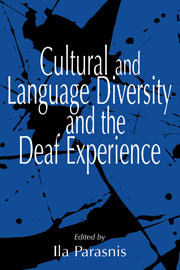Book contents
- Frontmatter
- Contents
- Preface
- PART I BILINGUALISM-BICULTURALISM AND THE DEAF EXPERIENCE: AN OVERVIEW
- PART II PSYCHOSOCIAL, COGNITIVE, AND LANGUAGE EXPERIENCES OF DEAF PEOPLE
- 5 From the Cultural to the Bicultural: The Modern Deaf Community
- 6 Early Bilingual Lives of Deaf Children
- 7 Communication Experiences of Deaf People: An Ethnographic Account
- 8 Marginality, Biculturalism, and Social Identity of Deaf People
- 9 Attitudes of the Deaf Community Toward Political Activism
- 10 Cultural and Language Diversity in the Curriculum: Toward Reflective Practice
- 11 Minority Empowerment and the Education of Deaf People
- 12 Social Assimilation of Deaf High School Students: The Role of School Environment
- PART III THE DEAF EXPERIENCE: PERSONAL REFLECTIONS
- Name Index
- Subject Index
11 - Minority Empowerment and the Education of Deaf People
Published online by Cambridge University Press: 05 June 2012
- Frontmatter
- Contents
- Preface
- PART I BILINGUALISM-BICULTURALISM AND THE DEAF EXPERIENCE: AN OVERVIEW
- PART II PSYCHOSOCIAL, COGNITIVE, AND LANGUAGE EXPERIENCES OF DEAF PEOPLE
- 5 From the Cultural to the Bicultural: The Modern Deaf Community
- 6 Early Bilingual Lives of Deaf Children
- 7 Communication Experiences of Deaf People: An Ethnographic Account
- 8 Marginality, Biculturalism, and Social Identity of Deaf People
- 9 Attitudes of the Deaf Community Toward Political Activism
- 10 Cultural and Language Diversity in the Curriculum: Toward Reflective Practice
- 11 Minority Empowerment and the Education of Deaf People
- 12 Social Assimilation of Deaf High School Students: The Role of School Environment
- PART III THE DEAF EXPERIENCE: PERSONAL REFLECTIONS
- Name Index
- Subject Index
Summary
Without special arrangements, students who are deaf constitute an oppressed minority similar to a variety of language minority groups for whom standard education is inaccessible. That I begin this chapter with such an explicit statement of ideology, informed by the work of Brazilian educator Paulo Freire, is testimony to the progress made by educational and political leaders who are deaf. I intend to do three things in this chapter. First, I will give a brief description of Freire's work and its relationship to contemporary thought about minority education. Second, I will attempt to show the connections between minority education and the education of students who are deaf. Finally, I will relate some of the concepts from Freire's philosophy to the specific process of the mathematics education of students who are deaf.
Freire has said that education is never neutral. Whether or not we acknowledge it, we always work from a philosophical perspective about the world when we teach. It would be a mistake to ignore the ideology inherent in Freire's work. His best-known book is entitled Pedagogy of the Oppressed (1970), and he does not use the concept of oppression metaphorically. He is referring to specific instances of power and domination of one group of people over another. As difficult as it may be for many of us to imagine, Freire dreams of a world in which no group of people would be under the control of another. He sees education as holding the possibility for obliterating oppression.
- Type
- Chapter
- Information
- Cultural and Language Diversity and the Deaf Experience , pp. 171 - 180Publisher: Cambridge University PressPrint publication year: 1996
- 5
- Cited by



